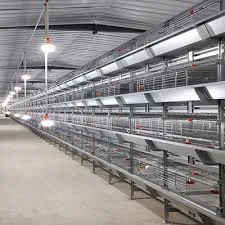feed pellet cooler
Nov . 19, 2024 22:56 Back to list
feed pellet cooler
Understanding Feed Pellet Coolers Enhancing Feed Quality and Efficiency
Feed pellet coolers play a crucial role in the production of high-quality animal feed, ensuring that the pellets retain their nutritional value and are suitable for storage and transportation. The process of pelletization involves compressing raw materials into small, dense pellets, which improve feed efficiency and minimize waste. However, overheating during this process can lead to loss of nutrients and a decline in pellet quality, making coolers an essential component in feed production.
Importance of Feed Pellet Cooling
After the pelletizing process, the pellets emerge from the extruder at elevated temperatures. If left uncooled, these hot pellets can easily degrade, cause moisture buildup, and develop mold during storage. Cooling not only prevents heat damage but also reduces the moisture content of the pellets, enhancing their shelf life and overall quality. Proper cooling ensures that the feed maintains its intended nutritional profile and remains palatable to livestock.
Types of Feed Pellet Coolers
There are generally two main types of feed pellet coolers static coolers and counter-flow coolers.
1. Static Coolers These coolers operate based on gravity, allowing hot pellets to fall through a bed of cold air. While simple and cost-effective, static coolers are less efficient in heat removal compared to more advanced systems.
feed pellet cooler

2. Counter-Flow Coolers The counter-flow design is typically more effective, utilizing a dynamic air flow system. In this setup, cold air flows counter to the direction of the pellets, allowing for maximum heat exchange. This method ensures that the pellets are cooled quickly and evenly, which is vital for maintaining quality.
Efficiency and Energy Savings
Investing in a high-quality feed pellet cooler pays off in terms of energy efficiency and production output. Advanced coolers are designed to minimize energy consumption while maximizing cooling performance. Many modern systems utilize heat exchanger technology to recover and reuse energy, thereby decreasing operating costs.
Maintenance and Operation
To ensure optimal performance, regular maintenance of feed pellet coolers is essential. Common practices include cleaning the air inlets, checking for airflow obstructions, and monitoring the operational parameters to prevent overheating. A well-maintained cooler not only boosts efficiency but also extends the life of the equipment, resulting in long-term cost savings.
Conclusion
In summary, feed pellet coolers are vital to the feed production process, ensuring that pellets are cooled effectively to preserve their quality and nutritional value. With the choice between various cooler designs, producers can select systems that meet their specific operational needs and enhance overall production efficiency. As the demand for high-quality animal feed continues to rise, the importance of effective cooling systems in safeguarding feed integrity cannot be overstated. Investing in advanced cooling technology is not just about maintaining quality; it is also about ensuring the sustainability and profitability of feed manufacturing operations.
-
Hot Sale 24 & 18 Door Rabbit Cages - Premium Breeding Solutions
NewsJul.25,2025
-
Automatic Feeding Line System Pan Feeder Nipple Drinker - Anping County Yize Metal Products Co., Ltd.
NewsJul.21,2025
-
Automatic Feeding Line System Pan Feeder Nipple Drinker - Anping County Yize Metal Products Co., Ltd.
NewsJul.21,2025
-
Automatic Feeding Line System - Anping Yize | Precision & Nipple
NewsJul.21,2025
-
Automatic Feeding Line System - Anping Yize | Precision & Nipple
NewsJul.21,2025
-
Automatic Feeding Line System-Anping County Yize Metal Products Co., Ltd.|Efficient Feed Distribution&Customized Animal Farming Solutions
NewsJul.21,2025






